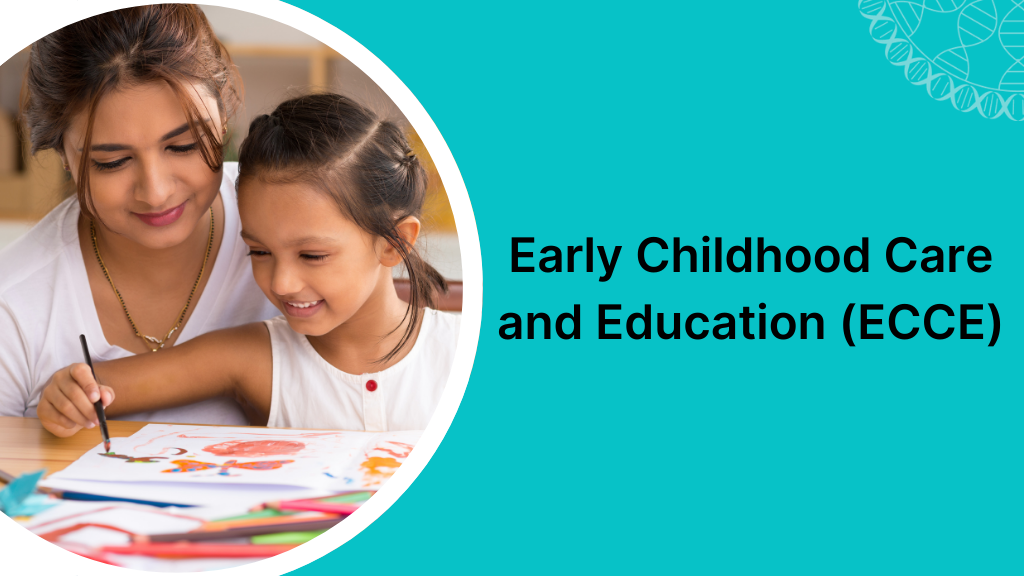
Early Childhood Care and Education (ECCE) – A Comprehensive Guide

21-Mar-2025
Early Childhood Care and Education (ECCE) – A Comprehensive Guide
Introduction to Early Childhood Care and Education (ECCE)
Early Childhood Care and Education (ECCE) is the foundation of a child's learning and development. It includes all the support and guidance provided to children from birth to the age of eight. ECCE is crucial because it helps in the physical, cognitive, social, and emotional development of children.
In India, ECCE has gained importance due to its role in shaping young minds. The government and private institutions work together to ensure that children receive quality early education. The National Education Policy (NEP) 2020 has also emphasized ECCE to provide better opportunities for children at a young age.
Why is ECCE Important?
ECCE is important because:
- It builds a strong foundation for lifelong learning.
- It helps in brain development, which is most rapid during the early years.
- It improves social and emotional skills, making children confident.
- It prepares children for formal schooling.
- It ensures that children develop problem-solving skills.
Children who receive quality ECCE have better chances of succeeding in school and later in life. This is why many countries, including India, focus on improving early childhood education.
Key Elements of ECCE
ECCE consists of different elements that work together to create a strong learning environment. These include:
1. Health and Nutrition
- Proper nutrition is essential for a child's growth and brain development.
- Regular health check-ups ensure that children stay healthy.
- Immunization protects children from diseases.
- Clean drinking water and hygiene practices prevent infections.
2. Early Learning
- Learning through play is the best way for young children.
- Storytelling, music, and dance make learning fun.
- Basic literacy and numeracy skills help in future learning.
- Teachers use creative teaching methods like games and art activities.
3. Emotional and Social Development
- Children learn to express their emotions in a healthy way.
- Interaction with other children improves social skills.
- Teachers and caregivers provide a nurturing environment.
- Children learn values like sharing, respect, and kindness.
4. Safe and Stimulating Environment
- A clean and safe environment is necessary for learning.
- Toys, books, and educational materials support learning.
- Teachers and caregivers play an important role in making children feel secure.
Government Initiatives for ECCE in India
The Indian government has introduced various programs to improve ECCE:
1. Integrated Child Development Services (ICDS)
- Started in 1975, ICDS is one of the largest programs in the world.
- Provides food, preschool education, and healthcare to children under 6 years.
- Anganwadi centers play a major role in implementing this program.
2. National Education Policy (NEP) 2020
- Focuses on providing universal access to ECCE.
- Introduces a 5+3+3+4 education structure.
- Encourages play-based learning for children aged 3-6.
3. Mid-Day Meal Scheme
- Ensures that children receive nutritious food.
- Helps in reducing malnutrition among young children.
4. Poshan Abhiyan
- Focuses on improving nutrition among children and mothers.
- Reduces malnutrition and stunting among children.
Role of Teachers and Caregivers in ECCE
Teachers and caregivers play an important role in ECCE. They:
- Create a friendly and loving environment.
- Use innovative teaching methods.
- Encourage children to explore and learn new things.
- Provide emotional support to children.
A well-trained teacher understands the needs of young children and helps them grow in a positive environment.
Challenges in ECCE Implementation
Although ECCE is important, there are some challenges in implementing it effectively in India:
1. Lack of Trained Teachers
- Many teachers are not properly trained in early childhood education.
- Lack of professional development programs for teachers.
2. Limited Infrastructure
- Many rural areas lack proper schools and Anganwadi centers.
- Lack of teaching materials and resources.
3. Low Awareness Among Parents
- Many parents do not understand the importance of ECCE.
- They do not send children to preschool due to financial or cultural reasons.
4. Nutrition and Health Issues
- Many children suffer from malnutrition, affecting their learning ability.
- Lack of proper healthcare services for children.
Solutions to Improve ECCE in India
To improve ECCE in India, the following steps should be taken:
1. Better Teacher Training
- Special training programs for ECCE teachers.
- Regular workshops and refresher courses.
2. Improved Infrastructure
- More Anganwadi centers and preschools should be established.
- Better teaching materials should be provided.
3. Parent Awareness Programs
- Educating parents about the importance of ECCE.
- Encouraging them to send children to preschool.
4. Enhanced Nutrition Programs
- Expanding mid-day meal schemes to preschool children.
- Ensuring access to healthcare and immunization services.
Best Practices for ECCE
To make ECCE successful, the following best practices can be followed:
1. Play-Based Learning
- Learning through play makes education enjoyable.
- Encourages creativity and problem-solving skills.
2. Interactive Teaching Methods
- Storytelling, singing, and dancing make learning fun.
- Use of colorful books and toys keeps children engaged.
3. Community Participation
- Involvement of parents and local community improves ECCE programs.
- Regular meetings between teachers and parents help in tracking child progress.
4. Technology Integration
- Using digital tools to enhance learning.
- Online videos and learning apps can help in early education.
Frequently Asked Questions (FAQs) on Early Childhood Care and Education (ECCE):
1Q: What is Early Childhood Care and Education (ECCE)?
Ans: ECCE refers to the care, learning, and development of children from birth to 8 years. It focuses on their physical, emotional, social, and cognitive growth.
2Q: Why is ECCE important?
Ans: ECCE is important because the early years shape a child’s future. Good early education helps brain development, builds social skills, and prepares children for formal schooling.
3Q: What are the key principles of ECCE?
- Learning through play
- Holistic development
- Child-centered approach
- Safe and stimulating environment
- Active participation of parents and teachers
4Q: What are the benefits of ECCE for children?
- Improves language and communication skills
- Develops social and emotional skills
- Builds early numeracy and literacy skills
- Encourages creativity and problem-solving
- Prepares children for school
5Q: What is the best age for early childhood education?
Ans: ECCE starts from birth but formal early education is usually from 3 to 6 years.
6Q: How can parents support early childhood education at home?
- Talk and read to the child regularly
- Encourage creative activities like drawing and storytelling
- Provide a safe and nurturing environment
- Allow children to play and explore freely
- Set a routine for learning and fun activities
7Q: What are the main challenges in ECCE?
- Lack of awareness among parents
- Shortage of trained teachers
- Poor infrastructure in rural areas
- Limited access to quality preschools
8Q: What is the role of teachers in ECCE?
- Teachers play a vital role by:
- Creating a child-friendly learning environment
- Using storytelling, play, and activities for learning
- Observing and guiding children’s development
- Encouraging curiosity and exploration
9Q: What is the difference between preschool and daycare?
- Preschool focuses on structured learning for children aged 3-6 years.
- Daycare provides childcare services for working parents and may include some learning activities.
10Q: What are some famous ECCE programs in India?
- Anganwadi centers under the Integrated Child Development Services (ICDS)
- Balwadi schools for early education
- National Education Policy (NEP) 2020 focusing on ECCE
11Q: How does play-based learning help in ECCE?
- Play-based learning helps in:
- Developing creativity and imagination
- Improving problem-solving skills
- Enhancing motor skills and coordination
- Encouraging teamwork and communication
12Q: What are some good activities for early childhood learning?
- Storytelling and picture reading
- Rhymes and songs
- Puzzles and building blocks
- Drawing and coloring
- Outdoor games and role play
13Q: What skills should a child learn before joining primary school?
- A child should develop:
- Basic literacy skills (identifying letters and numbers)
- Social skills (sharing, making friends)
- Motor skills (holding a pencil, cutting paper)
- Emotional skills (expressing feelings, confidence)
14Q: What is the National Education Policy (NEP) 2020’s role in ECCE?
- NEP 2020 aims to provide:
- Universal access to ECCE by 2030
- Focus on play-based learning
- Development of National Curriculum Framework for ECCE
15Q: How can schools improve ECCE?
- Hiring trained teachers
- Using child-friendly learning materials
- Providing safe and engaging classrooms
- Encouraging parental involvement
Conclusion
Early Childhood Care and Education (ECCE) is essential for the overall development of children. It provides them with a strong foundation for future learning and success. The Indian government has taken several steps to improve ECCE, but challenges remain. With better infrastructure, trained teachers, and parent awareness, ECCE in India can reach greater heights.
By ensuring quality early education, we can build a strong and bright future for our children. ECCE is not just about education; it is about giving every child the best start in life.

AUTHOR

Related Jobs


